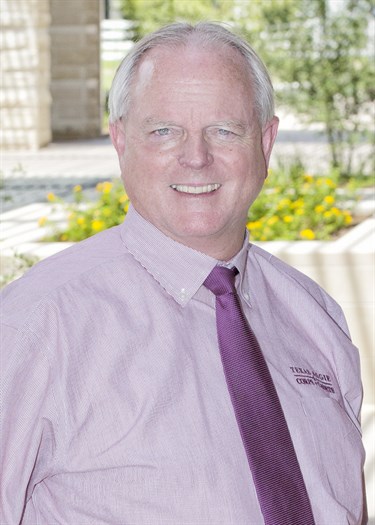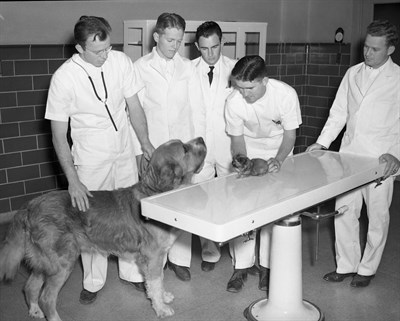Dr. Gerald Parker Brings ‘Healthy’ Perspective To CVM Initiative
When Gerald Parker Jr. came to Texas A&M as an undergraduate, he planned to follow in his father’s footsteps and become a veterinarian.

Completing both his bachelor’s degree in veterinary sciences and his Doctor of Veterinary Medicine degree in just five years, Parker was on the path his father had hoped for him; the next step would be to return to San Antonio, where Parker grew up, to join the family practice. But while serving in the Corps of Cadets (also like his father), Parker decided, instead, to join the military, where his trajectory would completely change, setting the stage for a “non-traditional career” that would take him through 26 years of military service and a decade of service with the U.S. Departments of Homeland Security (DHS), Health and Human Services (HHS), and Defense (DOD).
Within two years of joining the military, Parker’s work, and interest, in medicine began to shift from animals to humans, which was accentuated by opportunities to earn a doctorate in physiology from Baylor College of Medicine and to participate in the Industrial College of the Armed Forces at the National Defense University. He was the only Veterinary Corps officer asked to participate in the master’s program at the Industrial College, which was one of the premiere senior service schools for future military and civilian executive leaders.
“I’ve always thought every job I’ve taken was the best job I’ve ever had, and that was the best job I ever had, at the time. I was commander of the U.S. Army Medical Research Institute of Infectious Diseases, and when I got notification that I was selected, I first went, ‘Boy, I don’t want to leave this job,'” Parker said. “I talked to my commanding general, who was named General Parker, no relationship, and he said, ‘You’re crazy if you think you’re going to stay in (the) command (position); you’re going to do this, because you’re destined to do bigger things.’ So that’s what I did.
“It was a great experience,” Parker laughed. “I was really blessed to be selected and then to serve as student president for my class. The overall selection rate’s really low, and the in-residence program was hard work and competitive, but very interesting. I don’t know how I got it, but I did.”
Through the Industrial College’s rigorous curriculum, Parker learned about the elements of national power- economic, political, social, and military-as well as resourcing the U.S. national security strategy; this knowledge ultimately would benefit his governmental work in strategic policy and in developing his expertise in Global One Health.
When Parker retired from the military, the executive leadership experience he had in biodefense, emerging infectious diseases, global health security, and public health preparedness made him a natural fit within the DHS and, eventually, with the HHS, where he served as the principal deputy assistant secretary for preparedness and response.
As the No. 2 person in charge, he coordinated federal public health preparedness efforts and responses to Hurricanes Katrina thru Alex, the 2009 H1N1 flu virus pandemic, and the Haiti earthquake.
“It was during this time that emerging infectious diseases were recognized as threats to our national security and global health security became a public health focus,” Parker said.


“Today, the growing threat of a pandemic is one of society’s greatest challenges, and flu viruses have the highest pandemic potential; this is what keeps me up at night. But the emergence of new flu viruses are also right at the nexus of animals and humans, where we have prevention opportunities,” Parker said. “Veterinarians have a huge role to play, as most emerging infectious diseases are zoonotic; if we can prevent a spillover event from animals into humans, or detect it early, we may be able to prevent an outbreak anywhere from becoming a pandemic.”
Efforts to prevent, detect, and respond to the threat of the new flu viruses and other microbes are examples of how human, animal, and environmental health converge to form Global One Health, as a concept, to contain emerging infectious diseases at their source, according to Parker.
The actions also tie into the niche Parker hopes to carve out for Texas A&M as the new campus director for Global One Health and associate dean for Global One Health at the College of Veterinary Medicine & Biomedical Sciences (CVM).
“I believe that One Health’s time has come. One Health is a very complicated concept that, I’d be the first to tell you, is hard to define. I think the concept has suffered from trying to be too many things to too many people, rather than focusing on priority problems,” Parker said. “And it’s not just me saying that One Health is growing in importance, especially when focused on the fight against infectious diseases and related challenges, like antimicrobial resistance; this has been brought up by the biodefense Blue Ribbon Panel, the President’s Council of Advisors for Science and Technology, and recently by the G20 nations.”
At Texas A&M, Parker also holds joint appointments at the Bush School of Government Service and AgriLife Research. He believes this not only reflects the multidisciplinary nature of One Health, but will allow for greater collaboration across campus.
“Other colleges, faculty, and students want to be part of multidisciplinary coalitions to work on hard global problems, and if we do that, I know Texas A&M will make significant contributions to solving some of the most pressing challenges of our time,” Parker said.
There are many reasons why Parker decided to return his alma mater after his final governmental position in the DOD, including nostalgia.
“I felt there’s something I needed to give back, to help shape the next generation of leaders. I continue to have an interesting career from where I started as a student here; I never would’ve imagined the things that I did,” he said. “Veterinary medicine was a great foundation for me to build a career in national security and public health preparedness.”
While living in College Station with his wife, Denise-his high-school sweetheart, the mother of their three sons, a fellow Aggie, and one of his role models-Parker also hopes to be involved in mentoring students and raising awareness of the career opportunities available through Global One Health.
“We need to focus on emerging infectious diseases globally and locally, and what Texas A&M can do to be a part of the solution,” he said. “It’s a big challenge requiring academia, non-governmental organizations, government agencies, and international partners working together.”


